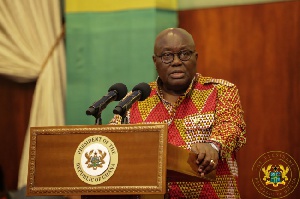The Akufo-Addo government inherited a broke and a virtually collapsed economy from the John Mahama led administration, leaving both the micro and macroeconomic fundamentals of the Ghanaian economy weak with large fiscal and external imbalances, high level inflation, high debt to GDP ratio of about 72% above threshold , a depreciated cedi, due to poor economic management, reckless borrowing, fiscal indiscipline and corruption under John Mahama led administration, which kept Ghana’s medium-term prospects at risk.
Ghana had to eventually run to IMF for a bailout in 2013 imposing some strict conditionality’s on the government of Ghana, the government had no choice than to put a freeze on employment, increase utility tariffs which brought a lot of hardships to the good people of Ghana
However, despite all the challenges and constraints inherited by the Akufo-Addo government, they have been able to turn things around and Ghana is now experiencing massive economic transformation within the 2years of the Akufo-Addo government as compared to the 8yeras of the Millis- Mahama administration
Today in 24 months we can talk about Free SHS, restoration of teachers and nursing trainee allowances, NABCO, abolishment of 15 nuisance taxes, reduction of electricity tariffs, Digital property addresses, Mobile money interoperability systems, fight against galamsey, office of special prosecutor, issuance of National I.D, $100 million dollar fund for NEIP, implementation of planting for food and jobs, paperless port systems, one village one dam, one district one factory, creation of new regions and districts, Zongo development fund, establishment of three development authorities,re-opening of the Obuasi Gold Mine etc.
Additionally, the Akufo-Addo government has changed the economy of this country with huge gains in the area of real GDP growth up to 7.4% by the end of 2018, reduction in inflation from 15.4% in 2016 to 9.6% in 2019 and fiscal deficit reduced from 9% in 2016 to 4.5% in 2018, reduction in the rate of borrowing, increased international reserves, stabilized the local currency, attainment of primary balance surplus and trade surplus, reduction of debt to GDP ratio from 72% in 2016 to 57.4% in 2018, significant reduction of the bank of Ghana policy rate, etc.
These developments are in sharp contrast to what was witnessed under the first 24 months and even the 8 years of the Mills-Mahama administration. If indeed Ghanaians voted for change then we have had ‘Value for our Vote’ unless we want to look into the faces of everyone and say we want to go back to the era of the NDC where almost every economic indicator took the opposite direction from what they ought to have been. The John Mahama Administration wasted the first 2 years from 2009 to 2011 without any significant development but rather a freeze on employment as a result of an IMF programme.
Today, Akufo-Addo after all the tax cuts and social intervention policies has employed over 16,000 teachers, recruited nurses and health service workers who were abandon from the Mahama administration about 30,000 of them, paid arrears due teachers that the Mahama administration did not pay, paid the huge debt at NHIS, paid about 80% of DKM victims and NYEP beneficiaries, and have employed about 100,000 graduates in the first 2 years of the Akufo-Addo government.
The Akufo –Addo government deserves our total support to continue to deliver on its Ghana beyond Aid agenda to bring prosperity and transformation to the good people of Ghana
Opinions of Wednesday, 23 January 2019
Columnist: Democratic Alliance Ghana



















